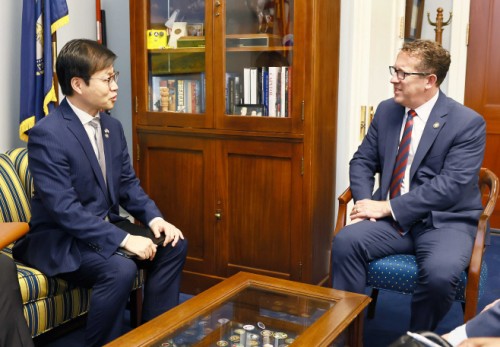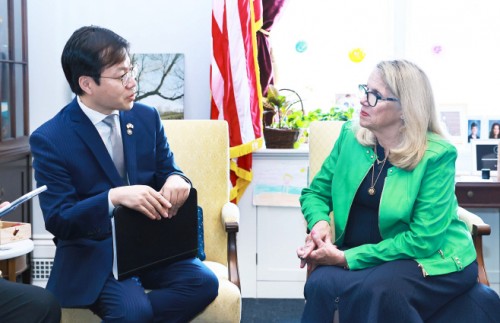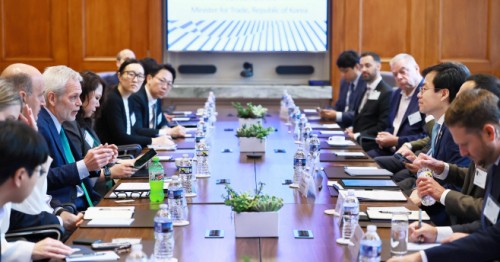 |
| Yeo Han-koo (left), South Korea’s Minister for Trade Negotiations, meets with Rep. Adrian Smith, chair of the House Ways and Means Subcommittee on Trade, at the U.S. Capitol in Washington, D.C., on June 25. / Courtesy of the Ministry of Trade, Industry and Energy |
A group of 43 U.S. House lawmakers has urged the Trump administration to address South Korea’s proposed online platform law, criticizing it as unfairly targeting American digital companies while excluding major Chinese tech firms. The lawmakers warned that the legislation could undermine U.S. businesses and serve the interests of the Chinese Communist Party.
In a letter dated June 30, House Ways and Means Trade Subcommittee Chair Adrian Smith (R-NE) and Rep. Carol Miller (R-WV) called on Treasury Secretary Scott Bessent, Commerce Secretary Howard Lutnick, and U.S. Trade Representative Jamieson Greer to raise the issue in ongoing trade negotiations with South Korea. According to Smith’s office, the lawmakers described the proposed law as a trade barrier that unjustly singles out U.S. digital firms.
 |
| Yeo Han-koo (right), South Korea’s Minister for Trade Negotiations, meets with Rep. Carol Miller at the U.S. Capitol in Washington, D.C., on June 25. / Courtesy of the Ministry of Trade, Industry and Energy |
The lawmakers argued the bill—pushed by South Korea’s Fair Trade Commission and supported by President Lee Jae-myung’s new administration—“disproportionately targets U.S. digital companies through enhanced regulatory requirements.” They also claimed the legislation mirrors the European Union’s “blatantly discriminatory” Digital Markets Act (DMA), imposing arbitrary legal and enforcement standards designed to disadvantage successful American business models.
“This kind of excessive and subjective antitrust enforcement will not only lead to unfair investigations and penalties but also severely limit U.S. companies' ability to operate in the Korean market,” the letter warned.
The lawmakers specifically highlighted the exemption of Chinese tech giants such as ByteDance (TikTok’s parent company), Alibaba, and Temu, arguing that the law disproportionately targets U.S. firms and would “advance the interests of the Chinese Communist Party.”
The issue has been on Washington’s radar since the Biden administration, with business groups like the U.S. Chamber of Commerce voicing concern. The Trump administration now reportedly considers the law a key trade barrier.
 |
| Yeo Han-koo attends a roundtable hosted by the U.S. Chamber of Commerce at its headquarters in Washington, D.C., on June 27. / Courtesy of the Ministry of Trade, Industry and Energy |
Trump recently demonstrated his hardline stance by unilaterally halting trade talks with Canada over its plan to implement a digital services tax, prompting Ottawa to retract the measure.
Smith and Miller, who led the letter campaign, met with South Korea’s Trade Minister for Negotiations Yeo Han-koo on June 25 during his visit to Washington. Rep. Miller has also introduced legislation requiring the administration to respond with actions such as WTO disputes, Section 301 investigations, or measures under the Korea-U.S. FTA if South Korea imposes discriminatory regulations on U.S. tech companies.
In a press briefing held at the Korean Embassy in Washington on June 27, a senior Korean official acknowledged the growing tension. “The Trump administration tends to respond very strongly to any regulation or tax that has a discriminatory or adverse effect on U.S. tech firms,” the official said. “We must manage this issue carefully to prevent further trade friction from negatively impacting our economy.”
Most Read
-
1
-
2
-
3
-
4
-
5
-
6
-
7





















